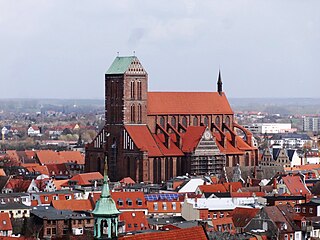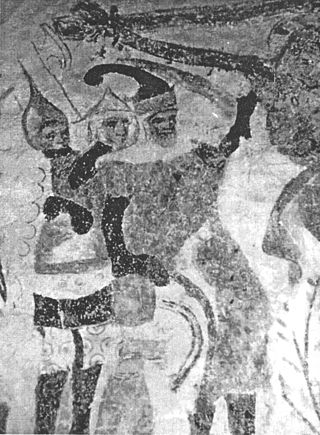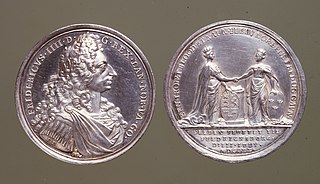Literature
- Wolf-Dieter Mohrmann: Der Landfriede im Ostseeraum während des späten Mittelalters, 1972, ISBN 3784740022
The Rostock Peace Treaty (German : Rostocker Landfrieden) was a treaty, or Landfriede , agreed on 13 June 1283 in Rostock to secure the peace on land and at sea, as well as the protection of taxes and other freedoms. The parties to the treaty agreed that, for ten years, they would avoid the use of force in exercising their rights. This treaty was the foundation for the economic growth of Wismar and other medieval seaports on the Baltic Sea.
The signatories to the treaty were the Hanseatic towns of Lübeck, Rostock, Wismar, Stralsund, Greifswald, Stettin, Demmin and Anklam as well as the dukes of Saxony and Pomerania, the Prince of Rügen, the lords of Schwerin and Dannenberg as well as the lesser nobility of Rostock.

Mecklenburg is a historical region in northern Germany comprising the western and larger part of the federal-state Mecklenburg-Western Pomerania. The largest cities of the region are Rostock, Schwerin, Neubrandenburg, Wismar and Güstrow.

Mecklenburg-Vorpommern, also known by its anglicized name Mecklenburg–Western Pomerania, is a state in the north-east of Germany. Of the country's sixteen states, Mecklenburg-Vorpommern ranks 14th in population; it covers an area of 23,213 km2 (8,963 sq mi), making it the sixth largest German state in area; and it is 16th in population density. Schwerin is the state capital and Rostock is the largest city. Other major cities include Neubrandenburg, Stralsund, Greifswald, Wismar, and Güstrow. It was named after the two regions of Mecklenburg and Vorpommern, and its name means the "nearer part of Pomerania", with the rest now lying in Poland.

Wismar, officially the Hanseatic City of Wismar is, with around 43,000 inhabitants, the sixth-largest city of the northeastern German state of Mecklenburg-Vorpommern, and the fourth-largest city of Mecklenburg after Rostock, Schwerin and Neubrandenburg. The city was the third-largest port city in former East Germany after Rostock and Stralsund.

Stralsund, officially the Hanseatic City of Stralsund, is the fifth-largest city in the northeastern German federal state of Mecklenburg-Western Pomerania after Rostock, Schwerin, Neubrandenburg and Greifswald, and the second-largest city in the Pomeranian part of the state. It is located on the southern coast of the Strelasund, a sound of the Baltic Sea separating the island of Rügen from the Pomeranian mainland.
Nordwestmecklenburg is a Kreis (district) in the north-western part of Mecklenburg-Vorpommern, Germany. It is situated on the coast of the Baltic Sea and borders on Schleswig-Holstein to the west. Neighboring districts are Rostock, Ludwigslust-Parchim and the district-free city Schwerin, and the district Lauenburg and the district-free city Lübeck in Schleswig-Holstein. The district seat is the town Wismar.

The Dominions of Sweden or Svenska besittningar were territories that historically came under control of the Swedish Crown, but never became fully integrated with Sweden. This generally meant that they were ruled by Governors-General under the Swedish monarch, but within certain limits retained their own established political systems, essentially their diets. Finland was not a dominion, but an integrated part of Sweden. The dominions had no representation in the Swedish Riksdag as stipulated by the 1634 Instrument of Government paragraph 46: "No one, who is not living inside the separate and old borders of Sweden and Finland, have anything to say at Riksdags and other meetings..."

The Bay of Mecklenburg, also known as the Mecklenburg Bay or Mecklenburg Bight, is a long narrow basin making up the southwestern finger-like arm of the Baltic Sea, between the shores of Germany to the south and the Danish islands of Lolland, Falster, and Møn to the north, the shores of Jutland to the west, and joining the largest part of the Baltic to the east.

The Victual Brothers, Vitalien Brothers or Vitalian Brethren were a loosely organized guild of 14th century Germanic privateers. They initially included Mecklenburg nobility, but later became an organisation of commoners, and later evolved into piracy. The guild had a clear historical effect in that era on maritime trade in the North and Baltic Seas. As privateers, they provisioned blockaded locations and otherwise served as a naval contingent on behalf of regional rulers, with clients that included the Queen of Denmark, and rulers of Mecklenburg and East Frisia. As their activities turned to piracy, the aims devolved to personal enrichment.

The Treaty of Frederiksborg was a treaty signed at Frederiksborg Castle, Zealand, on 3 July 1720, ending the Great Northern War between Denmark-Norway and Sweden.
Perpetual Peace or Eternal Peace may refer to:

The Treaty or Peace of Lübeck ended the Danish intervention in the Thirty Years' War. It was signed in Lübeck on 22 May 1629 by Albrecht von Wallenstein and Christian IV of Denmark, and on 7 June by Ferdinand II, Holy Roman Emperor. The Catholic League was formally included as a party. It restored to Denmark–Norway its pre-war territory at the cost of final disengagement from imperial affairs.

Glasin is a municipality in the Nordwestmecklenburg district, Mecklenburg-Western Pomerania, Germany.
The Confederation of Cologne was a medieval military alliance against Denmark signed 1367 by cities of the Hanseatic League on their meeting called Hansetag in Cologne.
Treaty of Prenzlau or Peace of Prenzlau may refer to several treaties during a series of wars between the Margraviate of Brandenburg and the Duchy of Pomerania fought for control of Pomerania-Stettin, and possession of the Uckermark in the 15th century. The First Peace of Prenzlau ended a war fought between 1445 and 1448, while the Second Peace of Prenzlau ended a war fought between 1466 and 1468. In older documents, Prenzlau may be spelled Prenzlow, which was the common spelling during the time period the treaties were drawn and was only changed during the 19th century. Prenzlau is situated in the center of Uckermark.

The Peace of Lund, signed on 16 September (O.S.) / 26 September 1679, was the final peace treaty between Denmark–Norway and the Swedish Empire in the Scanian War.

The Bezirk Rostock was a district (Bezirk) of East Germany. The administrative seat and the main town was Rostock.
Henry II, Lord of Mecklenburg, nicknamed the Lion was regent of Mecklenburg from 1287 to 1298, co-regent from 1298 to 1302 and ruled alone again from 1302 to 1329.
The Ewiger Landfriede of 1495, passed by Maximilian I, German king and emperor of the Holy Roman Empire, was the definitive and everlasting ban on the medieval right of vendetta (Fehderecht). In fact, despite being officially outlawed, feuds continued in the territory of the empire until well into the 16th century.

The Dano-Hanseatic War from 1426–1435 was an armed trade conflict between the Danish-dominated Kalmar Union and the German Hanseatic League (Hansa) led by the Free City of Lübeck.
Rostock, officially the University and Hanseatic City of Rostock is the largest city in the German federal state of Mecklenburg-Western Pomerania.